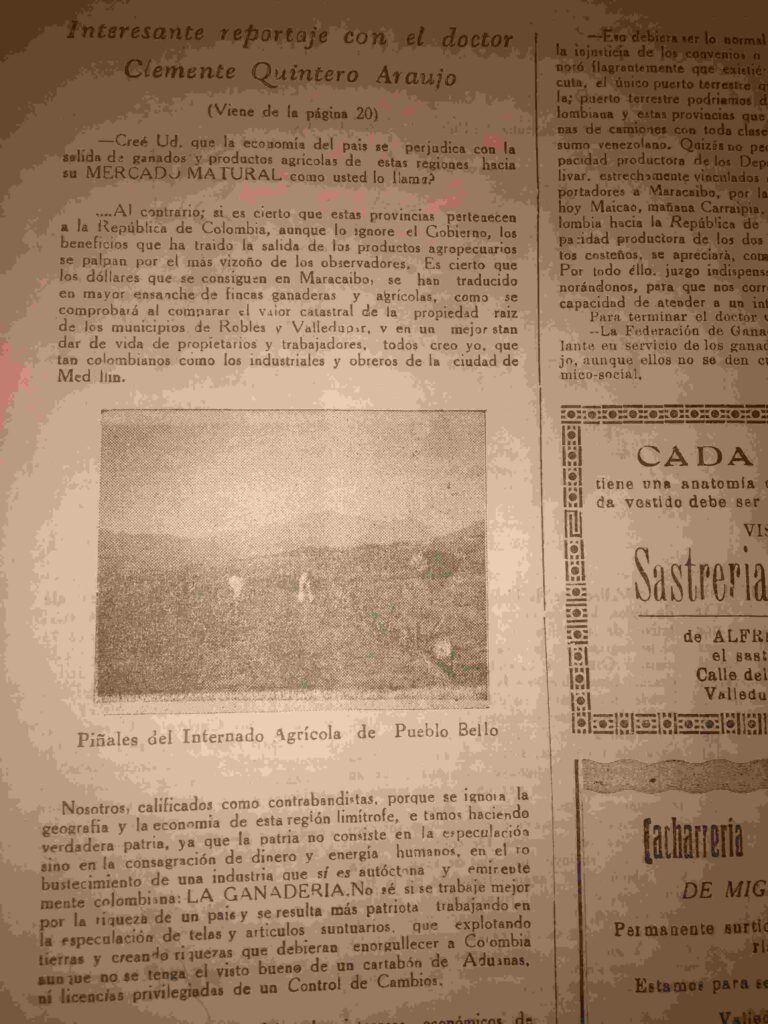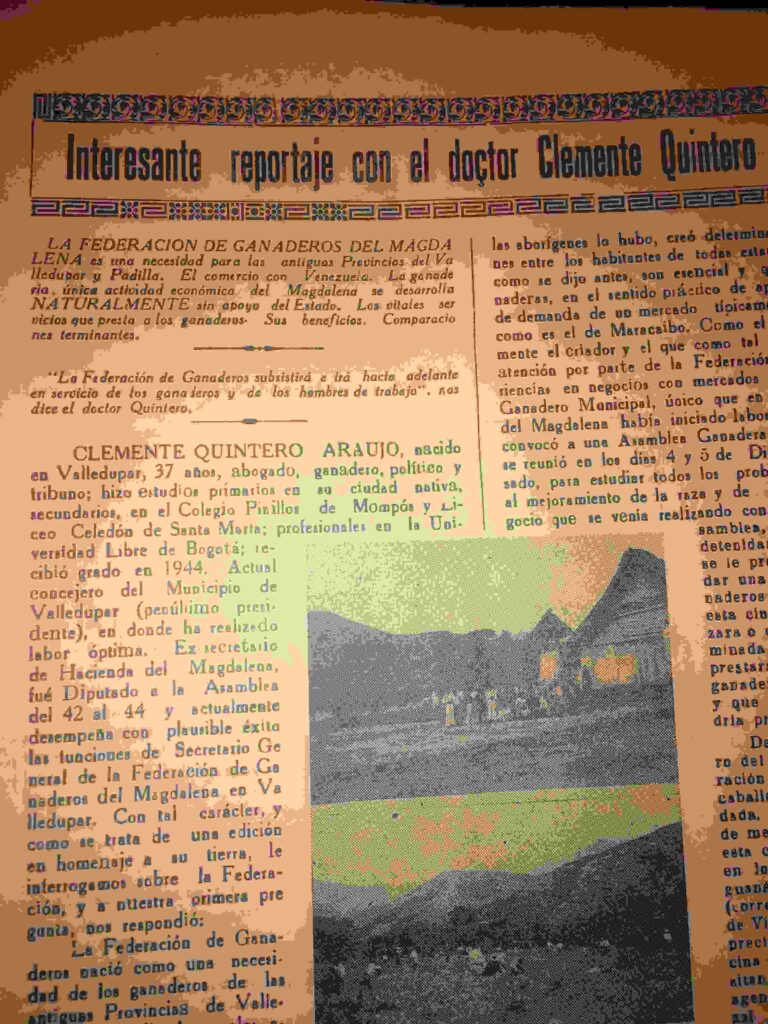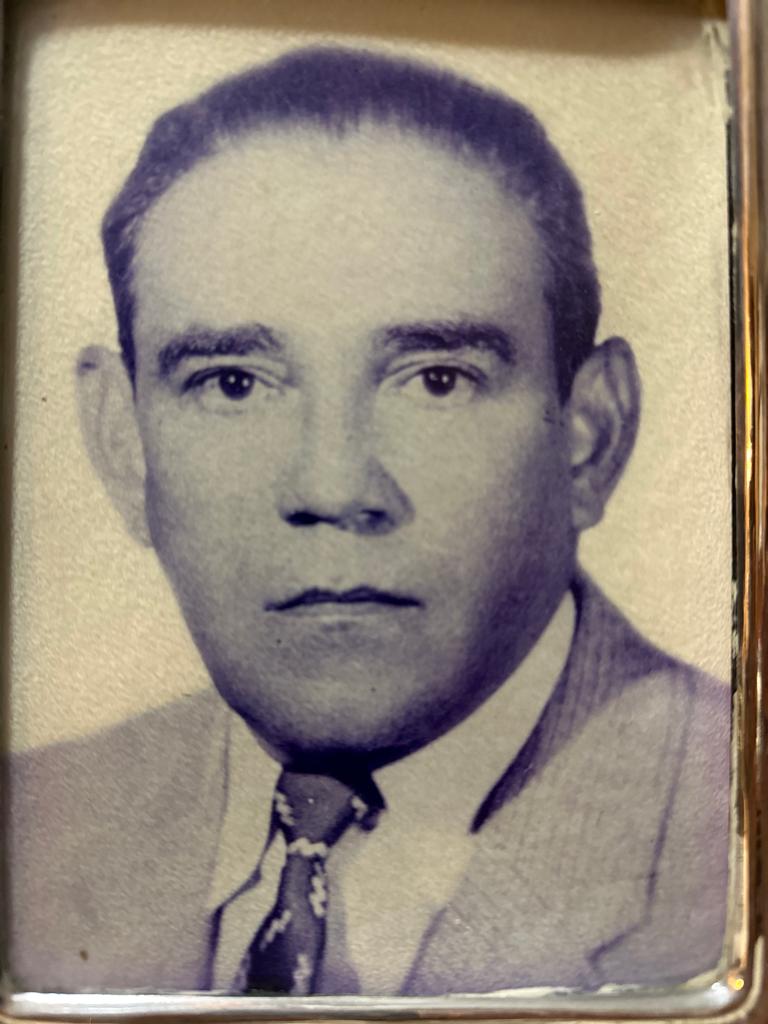EL PILÓN EDITORIAL
In the Costa y Mar magazine of October 10, 1949, which devoted more than 60 pages to Valledupar, an interview was conducted with Clemente Quintero Araujo entitled “Interesting report with Dr. Clemente Quintero Araújo, then General Secretary of the Federation of Cattlemen of the Magdalena, born in Valledupar.
The report becomes current 74 years later due to the importance of livestock in our region, the interviewee says that “Colombian livestock originated here”, because the first federation of livestock farmers in the country was created in Valledupar in December 1948 (15 years later FEDEGAN was created), due to the importance of Venezuela, the ignorance and controls of the central government and the accusations against the union.
“Clemente Quintero Araújo, born in Valledupar, 37 years old, lawyer, rancher, politician and tribune. He completed primary studies in his native city, secondary studies at the Colegio Pinillos in Mompós and Liceo Celedón, in Santa Marta; professional from the Free University of Bogotá; He received a degree in 1944. He is currently a councilor of the municipality of Valledupar (penultimate president), where he has done excellent work. Former Magdalena Treasury Secretary, he was a deputy to the Assembly from 1942 to 1944 and currently performs with plausible success the duties of General Secretary of the Magdalena Cattlemen’s Federation in Valledupar. With such character, and as it is an edition in homage to his land, we questioned him about the Federationand to our question, he answered us:
“The Federation of Cattlemen was born as a necessity of the cattlemen of the old provinces of Valledupar and Padilla, which despite being authentically cattlemen since the first days of La Colonia, since Colombian cattle raising originated here, have not had no support or defense from official and semi-official entities.
The cattle industry is the only economic activity in the department of Magdalena, discounting the banana zone, which amounts to a very small part of the Magdalena territory. This industry has developed ‘naturally’; there has only been the generous effort of the land and of the breeders. This fact would be enough to verify the quality of cattle that until very recently did not cross, and also the conditioning of the weather factor for this industry.

The intensification of the livestock trade with the Venezuelan market, a trade that for geographical reasons dates back to before La Colonia, since it existed among the aborigines, created certain concerns among the inhabitants of all these provinces that, as said before, are essential. and chemically cattle, in the practical sense of taking advantage of the excess demand of a typically industrialized market such as Maracaibo.
As the cattle rancher, especially the breeder and as such deserves the greatest attention from the Federation, had no experience in business with foreign markets, the Municipal Livestock Committee, the only one in the department of Magdalena that had started unionization work, convened a Regional Livestock Assembly, which met on December 4 and 5 of last year (1948), to study all the problems concerning the improvement of the breed and cattle and the business that was being carried out with Maracaibo.
The Assembly, after carefully studying the agenda that was presented to it, decided to found a Federation of Cattlemen with residence in this city, to organize or control the indiscriminate departure of cattle and provide the services that the cattleman had never had and that the The state could not lend it either.
Since the first of January of this year (1949), the Federation has been fully fulfilling the entrusted mission. We have a veterinary medicine store in this city, and three agencies in the municipalities of Chiriguaná, Fonseca and Urumita (Villanueva corregimiento) that sell all the medicine our cattle need at cost price. Other agencies are about to open in Fundación, Codazzi and Distracción, these last two corregimientos of Robles (La Pa today) and Fonseca. The Federation is sustained by annual membership fees and by the contribution that each exporter of cattle and pigs spontaneously recognizes per head of animal. The Federation rewards this contribution with medicines at low prices and a vaccinator service established in several municipalities. Likewise, the official veterinarians doctors Francisco Márquez Iguarán and the directors of the Livestock Farm who want to understand that the Federation is not a political group, but a public service entity without the help or cooperation of the State, serve the Federation.

Do you think that the country’s economy is harmed by the departure of livestock and agricultural products to its “natural market” as you call it?
On the contrary, if it is true that these provinces belong to the Republic of Colombia, even if the government ignores it, the benefits that the output of agricultural products has brought are palpable by the most inexperienced of observers. It is true that the dollars obtained in Maracaibo have translated into a greater expansion of cattle and agricultural farms, as will be verified when comparing the cadastral value of the real estate of the municipalities of Robles and Valledupar and in a better standard of living for owners. and workers, I think all of them are as Colombian as the industrialists and workers of the city of Medellín.
We, qualified as smugglers, because the geography and economy of this border region are ignored, are making a true homeland, since the homeland does not consist in speculation but in the consecration of money and human energy, in the strengthening of an industry that it is autochthonous and eminently Colombian: livestock. I don’t know if one works better for the wealth of a country and is more patriotic working in the speculation of fabrics and luxury articles, than exploiting land and creating wealth that should make Colombia proud, even if one does not have the approval of a square of Customs, nor privileged licenses of an Exchange Control.
Do you think it would suit the economic interests of these provinces that the government, by signing a Modus Vivendi treaty with the Republic of Venezuela, make a serious, responsible and documented study of their production capacity?
That should be normal so that the injustice of past agreements or treaties in which our existence in this country was flagrantly ignored is not committed. Cúcuta is not the only land port that the country has towards Venezuela; Land port, we could say that it is the entire Colombian Guajira and these provinces that daily see caravans of trucks with all kinds of articles necessary for Venezuelan consumption. Perhaps I would not sin, if I affirm, that given the productive capacity of the departments of Magdalena and Bolívar, closely linked to their economy and uncontrolled exporters to Maracaibo, due to the ease of the roads that are today Maicao, tomorrow Carraipía, the first land port from Colombia to the Republic of Venezuela.
Comparing the productive capacity of the two Santanders with the coastal departments, it will be appreciated how true my statement is. For all these reasons, I deem it essential that the government does not continue to ignore us so that it reciprocates and sees that we are indeed capable of attending to an international interest of the Republic.
To finish, Dr. Quintero Araujo tells us:
The Federation of Ranchers will survive and go forward in the service of ranchers and working men, even if they do not realize its economic and social significance.
